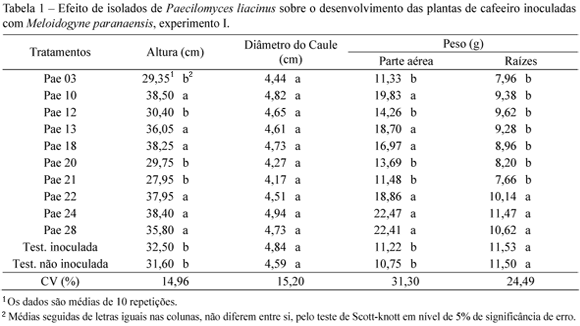In order to reduce the losses caused by nematodes of the genus Meloidogyne (Goeldi, 1887) in coffee plantation, among several management measures, biological control with the fungus Paecilomyces lilacinus (Thom., 1910) Samson, 1974 stands out as an advantageous alternative of control, from the ecological or economy points of view. Thus, the objective of this work was to evaluate ten isolates of Paecilomyces lilacinus in the control of Meloidogyne paranaensis in coffee trees (Coffea arabica L.) cv. Icatú, in greenhouse conditions. In the first experiment, the coffee seedlings were transplanted to substrate where tomato plants were previously cultivated, for M. paranaensis multiplication. The soil was mixed with 50 g rice colonized with ten isolates of P. lilacinus. In the second experiment, coffee seedlings were transplanted to substrate (1 sand: 1 dirt) with 50 g rice colonized with the isolates of P. lilacinus. Then, the seedlings were inoculated with suspension of ±5000 eggs of M. paranaensis. In the two experiments, a new application was made with 50 g of the isolates after fifteen days. The design was completely randomized with twelve treatments and ten replicates. After 90 they days were evaluated. The isolated of P. lilacinus did not affect the diameter of the coffee stalk. In the first experiment, the isolates Pae 22, 24, and 28 promoted the growth of the seedlings, all of the isolates reduced the population of eggs in the root system, and the isolates Pae 3 and 12 reduced the population of J2 of M. paranaensis in the soil. In the second experiment, the isolates Pae 3, 10, 12, and 13 favored the growth of the plants but reduced the weight of the fresh roots, all of the isolates reduced the population of J2 in the soil, and the isolates Pae 3, 10, 13, 18, 22, and 24 reduced the malformations caused by M. paranaensis roots.
Biological control; Paecilomyces lilacinus; Meloidogyne paranaensis




